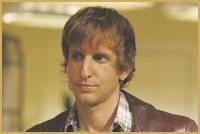It makes me proud to live in a country where you can say the word “fuck” on primetime television without subscribing to cable–prouder still to have that “fuck” funded with taxpayer’s money. Out of respect for that privilege, I’ve been trying to wean myself off of American television and watch more Canadian shows. One of my favourites was Godiva’s until CHUM Television cancelled it.
Set in a Yaletown eatery, Godiva’s was that rarest of Canadian TV shows. Well lit and sexy, this was not the dreary, mercurial, Vancouver of DaVinci’s Inquest but the cosmopolitan, mini-metropolis that we all know and love. The show was also notable for Michael McMurtry’s portrayal of Cordell, the in-your-face gay waiter.
Series co-creator, Michael MacLennan, describes Cordell best. “What I was interested in doing was showing how an absolutely, unabashed queer man can exist in a larger context,” he says. “I wouldn’t say Godiva’s is a gay world but it’s not a straight world either, it’s the kind of world that most of us live in: young, urban and tolerant.”
MacLennan had just come off four years of writing Queer as Folk when approached to do Godiva’s. Although he wasn’t interested in writing about another group of gay men, he knew it wasn’t possible to do a show about a restaurant without one of the characters being gay. Cordell was based on a friend–“a career waiter who added this amazing element of performance to the way he served his tables,” he says.
Just a stone’s throw away from the service industry myself, I have come to know my fair share of Cordells. What made Cordell believable to me was his voice–nasal but assertive, the kind of waiter who has the confidence to recommend something you won’t like. And he was all the more interesting to watch because a straight actor played him so convincingly. It was eerie.
“My refrain was, ‘We have to cast a gay person in this role and we looked at all the gay actors that we could find,” says MacLennan. “Then Michael McMurtry walked in the room and he absolutely got the character. He was so fearless, he didn’t care whether or not we liked him and that’s really who Cordell is.” That would also describe half the gay waiters in Vancouver, at least the good ones.
Every now and then I found myself playing Comic Book Guy from The Simpsons with the show. For instance, while the straight characters referenced the Georgia Straight, City Cooks, and Aritzia, why wasn’t Cordell reading Xtra West, dancing at Celebrities, or buying lube at Little Sister’s? On the upside, there was never an attempt to make Cordell palatable to a straight or gay audience. “I didn’t want to soften him up to please people who would say, ‘Look what he’s saying about gay people,'” says MacLennan.
In one of my favourite episodes Cordell gets tested for HIV so he can have unprotected sex with his boyfriend. It ends with Cordell desperately pounding on the clinic doors after hours, begging a nurse to give him his test results. As I watched it, I thought, “That is so not possible,” yet emotionally, I was right there with him. You don’t see those kinds of story lines on TV every day and I’m going to miss them when they’re gone.
To prepare for this article, I fast-forwarded through some video of the show’s first season and came across a Conservative campaign ad right after a gay oral sex scene. I wondered if Stephen Harper knew where his campaign dollars were going. Now that he’s in office, I wonder what effect the new Conservative government will have on honest portrayals of gays on TV.
Unless the CBC’s Getting Along Famously is renewed, the only visibly gay people on Canadian TV will be Gavin Crawford on 22 Minutes and those two guys on the Coffee-Mate commercial. If they’re not gay, they should be.
I asked MacLennan if he thinks the new Conservative government would make it harder for gay characters to get on television.
“It would only take a few people to decide to protest that taxpayer’s money is going to this,” he says. “But you know what? It’s our taxes, so why shouldn’t we have an opportunity to be represented on our own screens? But it’s possible there could be a chilling effect because right now those right wing activists have a sympathetic ear in government that they didn’t with the Liberals in power.”
MacLennan adds, “I think it’s a bigger question of, is Canadian television ready for a show that is smart, urban, unapologetically Canadian and reflects the values of Canadians; the sense of humour, the freedom? We have a very fervent fan base that found our show and loved our show, but we also got cancelled.”

 Why you can trust Xtra
Why you can trust Xtra


